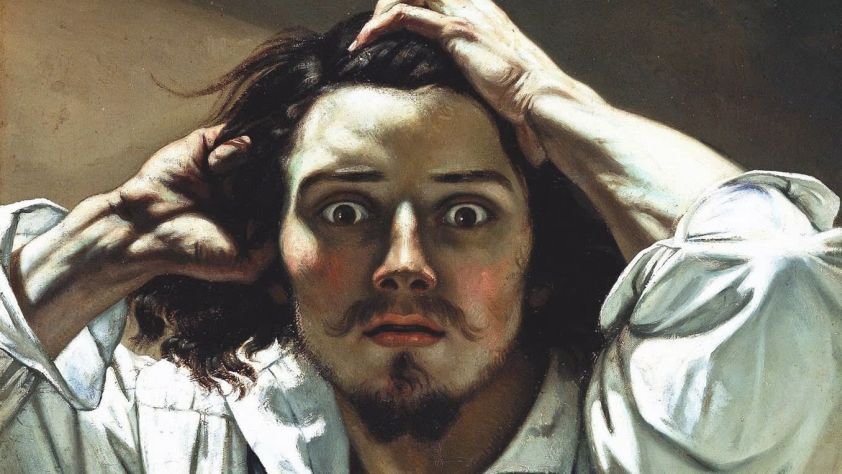 This story by Guy de Moupassant describes a man’s slow descent into madness, convinced that an invisible being he unknowingly lured from a passing ship is preying on his mind. As the entity (supposedly an otherworldly species of vampire that feeds on the life force of those it attaches to) gets stronger, he begins to lose his free will. Unable to flee, he traps it in his bedroom and burns his house to the ground. When this doesn’t work, he contemplates an even more extreme solution. Themes include reality vs. illusion, the unknown/supernatural, terror, madness, despair. More…
This story by Guy de Moupassant describes a man’s slow descent into madness, convinced that an invisible being he unknowingly lured from a passing ship is preying on his mind. As the entity (supposedly an otherworldly species of vampire that feeds on the life force of those it attaches to) gets stronger, he begins to lose his free will. Unable to flee, he traps it in his bedroom and burns his house to the ground. When this doesn’t work, he contemplates an even more extreme solution. Themes include reality vs. illusion, the unknown/supernatural, terror, madness, despair. More…
Archives
Diary of a Madman
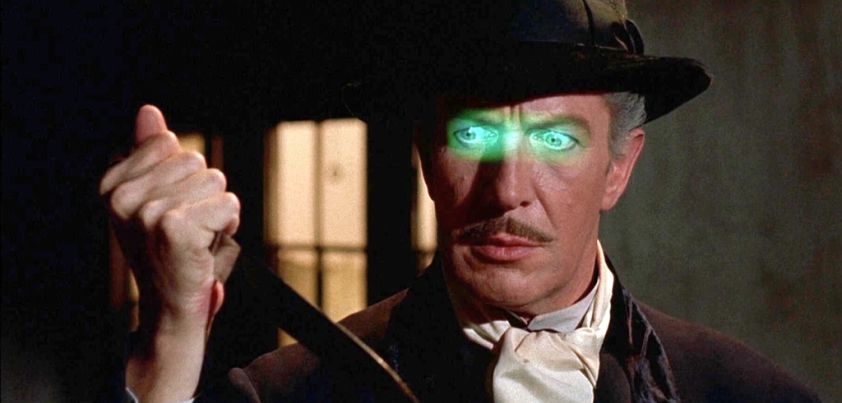 Although not one of Guy de Maupassant’s best known works, this is still a fascinating read. The madman (and in this case thrill killer) is a highly respected magistrate who sentences an innocent man to death for one of his own gruesome murders. Later, he gets an additional thrill from witnessing the poor man’s execution. The motif here is that even seemingly incorruptible members of society can descend into madness and commit the most heinous of crimes. Themes: madness, false impressions, society’s fascination with killing (especially as part of war), the undiscovered madmen among us. More…
Although not one of Guy de Maupassant’s best known works, this is still a fascinating read. The madman (and in this case thrill killer) is a highly respected magistrate who sentences an innocent man to death for one of his own gruesome murders. Later, he gets an additional thrill from witnessing the poor man’s execution. The motif here is that even seemingly incorruptible members of society can descend into madness and commit the most heinous of crimes. Themes: madness, false impressions, society’s fascination with killing (especially as part of war), the undiscovered madmen among us. More…
An Uncomfortable Bed
 In this story by Guy de Moupassant, a man on a hunting holiday stays in a large country house with a group of friends. They, and the protagonist, enjoy playing practical jokes on one another. When he arrives, the others seem much more jovial than usual. He is suspicious and, when they all go to bed, takes great care to make sure his room contains no traps. He doesn’t find any, but his friends still have a good laugh at his expense the next day. Themes include camaraderie, appearances vs. reality, suspicion, paranoia, embarrassment. More…
In this story by Guy de Moupassant, a man on a hunting holiday stays in a large country house with a group of friends. They, and the protagonist, enjoy playing practical jokes on one another. When he arrives, the others seem much more jovial than usual. He is suspicious and, when they all go to bed, takes great care to make sure his room contains no traps. He doesn’t find any, but his friends still have a good laugh at his expense the next day. Themes include camaraderie, appearances vs. reality, suspicion, paranoia, embarrassment. More…
Idyll
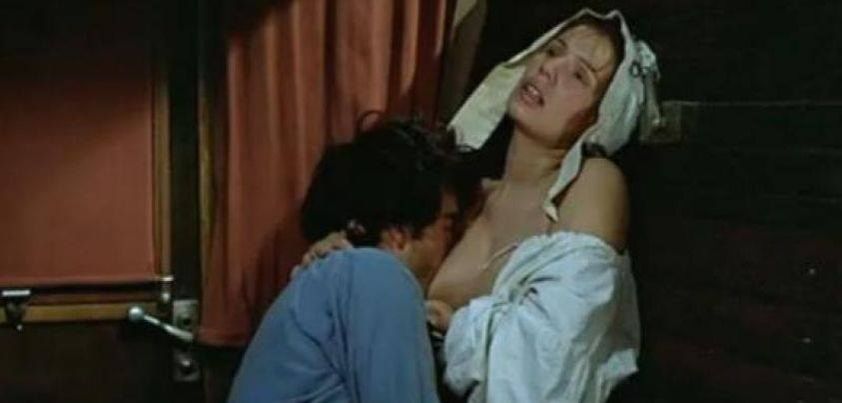 In this story by Guy de Maupassant, a man and woman share a compartment and become friends during a long train journey. The idyllic countryside is in contrast to the way the woman feels. She is a wet-nurse (a woman who cares for and breast-feeds other people’s babies) and is in great pain because she hasn’t had a baby to her breasts in over two days. The man offers to help and, in so doing, solves a problem of his own. Themes include connection, desire, social perceptions of human anatomy and function, defiance of social norms to satisfy a basic need. More…
In this story by Guy de Maupassant, a man and woman share a compartment and become friends during a long train journey. The idyllic countryside is in contrast to the way the woman feels. She is a wet-nurse (a woman who cares for and breast-feeds other people’s babies) and is in great pain because she hasn’t had a baby to her breasts in over two days. The man offers to help and, in so doing, solves a problem of his own. Themes include connection, desire, social perceptions of human anatomy and function, defiance of social norms to satisfy a basic need. More…
Was it a Dream?
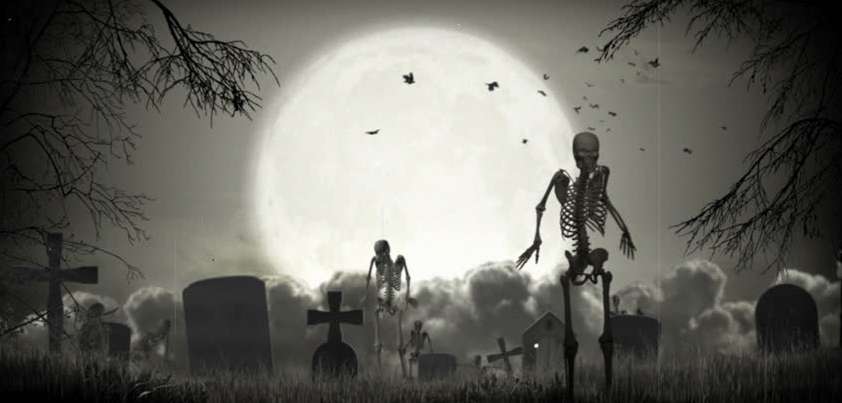 The question in the title of this Guy de Maupassant story could refer to two things: the blissful year the protagonist shared with his lover, or the vision he had while visiting her grave. Similarly, the feelings of emptiness and loss he experiences could be because of two things: the unexpected death of his lover, or what he learned/dreamed about her death in the cemetery. Themes include blind love (idolization blurring reality), infidelity and betrayal (perhaps on two levels if, as the first priest suggested, the woman was his mistress), obsessive grief, dreams/the supernatural. More…
The question in the title of this Guy de Maupassant story could refer to two things: the blissful year the protagonist shared with his lover, or the vision he had while visiting her grave. Similarly, the feelings of emptiness and loss he experiences could be because of two things: the unexpected death of his lover, or what he learned/dreamed about her death in the cemetery. Themes include blind love (idolization blurring reality), infidelity and betrayal (perhaps on two levels if, as the first priest suggested, the woman was his mistress), obsessive grief, dreams/the supernatural. More…
A Vendetta
 This story by Guy de Maupassant features an old widow who lives in a small village in Southern Italy with her only son and his dog. One evening, the son is murdered. The mother is so saddened by this that she swears a vendetta against the killer. Every day, she sits by the window wondering how she, a weak old woman with no one to help her, can carry out her promise. Finally, she comes up with an idea and has her revenge. Themes include grief, vengeance, cruelty, the brutality and potential for injustice of the code of vendetta. More…
This story by Guy de Maupassant features an old widow who lives in a small village in Southern Italy with her only son and his dog. One evening, the son is murdered. The mother is so saddened by this that she swears a vendetta against the killer. Every day, she sits by the window wondering how she, a weak old woman with no one to help her, can carry out her promise. Finally, she comes up with an idea and has her revenge. Themes include grief, vengeance, cruelty, the brutality and potential for injustice of the code of vendetta. More…
The Piece of String
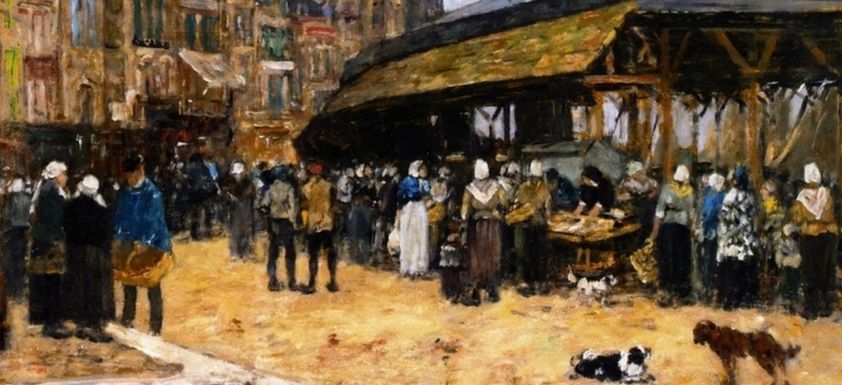 This Guy de Maupassant story involves a frugal farmer whose reputation is forever tarnished after a rival falsely accuses him of finding and failing to return a lost pocketbook. Sadly, he is the victim of a stereotype about “Norman craftiness”. No matter how much he protests that he picked up a piece of string, and even in the face of another peasant coming forward with the pocketbook, nobody will believe him. This weighs so much on the proud man’s mind that he wastes away to an early death. Themes: false accusations, stereotyping, injustice, pride, obsession with image/reputation. More…
This Guy de Maupassant story involves a frugal farmer whose reputation is forever tarnished after a rival falsely accuses him of finding and failing to return a lost pocketbook. Sadly, he is the victim of a stereotype about “Norman craftiness”. No matter how much he protests that he picked up a piece of string, and even in the face of another peasant coming forward with the pocketbook, nobody will believe him. This weighs so much on the proud man’s mind that he wastes away to an early death. Themes: false accusations, stereotyping, injustice, pride, obsession with image/reputation. More…
The (Diamond) Necklace
 This Guy de Maupassant story is about a beautiful woman who is unhappy with her situation in life. She has a loving husband with a secure government job, and they have enough money to hire a girl to do the harder housework. Sadly, she sees him as just a “little” clerk and dreams of being admired by richer and more important men. An invitation to a ball and loss of a borrowed necklace teach her how lucky she was, and what it means to be very poor. Themes include appearance vs. reality, class, discontent, vanity, pride, sacrifice, and suffering. More…
This Guy de Maupassant story is about a beautiful woman who is unhappy with her situation in life. She has a loving husband with a secure government job, and they have enough money to hire a girl to do the harder housework. Sadly, she sees him as just a “little” clerk and dreams of being admired by richer and more important men. An invitation to a ball and loss of a borrowed necklace teach her how lucky she was, and what it means to be very poor. Themes include appearance vs. reality, class, discontent, vanity, pride, sacrifice, and suffering. More…
The Jewels / False Gems
 This tongue-in-cheek story by Guy de Maupassant could be said to reflect two English proverbs: ignorance is bliss, and money can’t buy happiness. A recently widowed man of modest means is shocked to learn that his seemingly perfect wife had been living a decadent secret life. When he discovers that her “fake” jewels are real, he quits his job, becomes a man of leisure, and remarries a “very virtuous” woman who causes him much sorrow. The story introduces several important themes: appearances (things aren’t always as they seem), infidelity, vanity, hypocrisy, French bourgeois morality, exploitation of the working class. More…
This tongue-in-cheek story by Guy de Maupassant could be said to reflect two English proverbs: ignorance is bliss, and money can’t buy happiness. A recently widowed man of modest means is shocked to learn that his seemingly perfect wife had been living a decadent secret life. When he discovers that her “fake” jewels are real, he quits his job, becomes a man of leisure, and remarries a “very virtuous” woman who causes him much sorrow. The story introduces several important themes: appearances (things aren’t always as they seem), infidelity, vanity, hypocrisy, French bourgeois morality, exploitation of the working class. More…
The Devil
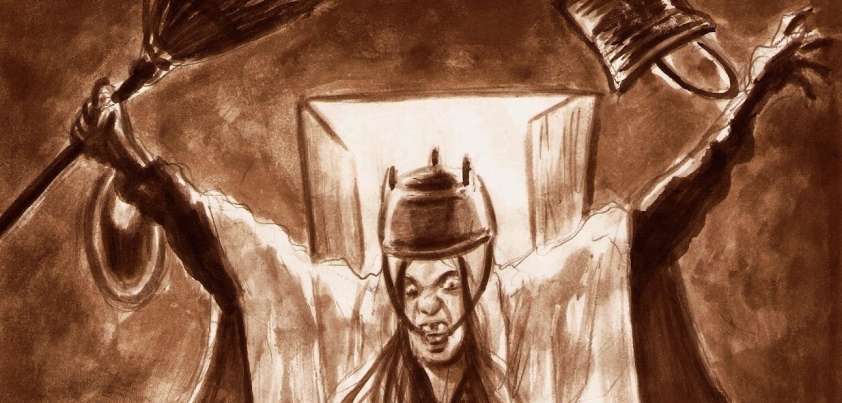 In The Devil, Guy de Maupassant adopts the unusual (for him) approach of lightening a dark story-line with some playful dialog. A heartless old washerwoman has a side job nursing fellow villagers as they approach death. She normally charges by the day, but when forced into agreeing to a flat fee she has a ‘devilish’ way of helping her patients move along sooner rather than later. The major theme is greed, as evidenced by the lengths she and other villagers will go to if they can save a penny (or in this case, a sou). Other themes: death, poverty, deceit. More…
In The Devil, Guy de Maupassant adopts the unusual (for him) approach of lightening a dark story-line with some playful dialog. A heartless old washerwoman has a side job nursing fellow villagers as they approach death. She normally charges by the day, but when forced into agreeing to a flat fee she has a ‘devilish’ way of helping her patients move along sooner rather than later. The major theme is greed, as evidenced by the lengths she and other villagers will go to if they can save a penny (or in this case, a sou). Other themes: death, poverty, deceit. More…
Two Friends
 Set during the four month the siege of Paris of 1870-1871, this story by Guy de Maupassant stereotypes (from a French perspective) the patriotism and valour of two Frenchmen and the barbaric brutality of the Prussian (German) soldiers surrounding the city. After a few drinks, two friends on opposite sides of the political spectrum (one a monarchist, the other a republican) set off to escape the deprivation and boredom of the besieged city by going fishing in the “no-man’s land” between the two armies. Themes: friendship, loyalty, patriotism, courage, the brutality of war. More…
Set during the four month the siege of Paris of 1870-1871, this story by Guy de Maupassant stereotypes (from a French perspective) the patriotism and valour of two Frenchmen and the barbaric brutality of the Prussian (German) soldiers surrounding the city. After a few drinks, two friends on opposite sides of the political spectrum (one a monarchist, the other a republican) set off to escape the deprivation and boredom of the besieged city by going fishing in the “no-man’s land” between the two armies. Themes: friendship, loyalty, patriotism, courage, the brutality of war. More…
A Dead Woman’s Secret
 We get a sense at the beginning of this Guy de Maupassant story that the dead woman lying peacefully in her bed may not have led as ‘saintly’ a life as is described. She has been hiding something from her family for most of her life. When going through some old letters, her son and daughter discover the secret. The son, a sanctimonious magistrate, judges her harshly. The daughter, who has devoted herself to the Church, says nothing but may harbor a secret of her own. Themes: things are not always as they seem, passion, adultery, rash judgement, hypocrisy, forgiveness More…
We get a sense at the beginning of this Guy de Maupassant story that the dead woman lying peacefully in her bed may not have led as ‘saintly’ a life as is described. She has been hiding something from her family for most of her life. When going through some old letters, her son and daughter discover the secret. The son, a sanctimonious magistrate, judges her harshly. The daughter, who has devoted herself to the Church, says nothing but may harbor a secret of her own. Themes: things are not always as they seem, passion, adultery, rash judgement, hypocrisy, forgiveness More…
Boule de Suif / Ball of Fat
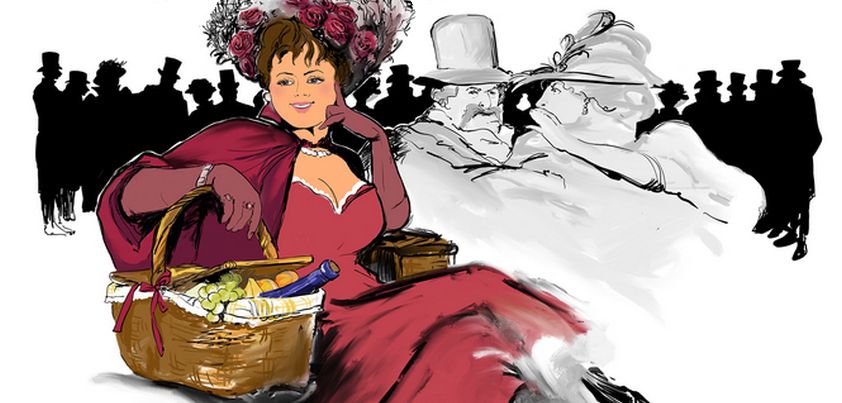 Regarded as one of Guy de Maupassant’s greatest works, this story explores the interactions between a prostitute with the unfortunate nickname Boule de Suif (Ball of Fat) and nine other coach passengers fleeing the Franco-Prussian War. Her fellow travelers comprise a cross-section of “respectable” French society: politics, business, the nobility and religion. Maupassant’s sad message about nineteenth-century France is that no matter what shows of kindness or sacrifices people of the lower classes make, they are unlikely to be treated with respect and dignity by those of higher social standing. Themes: social class, patriotism, manipulation, exploitation, sacrifice/moral compromise, ingratitude, hypocrisy. More…
Regarded as one of Guy de Maupassant’s greatest works, this story explores the interactions between a prostitute with the unfortunate nickname Boule de Suif (Ball of Fat) and nine other coach passengers fleeing the Franco-Prussian War. Her fellow travelers comprise a cross-section of “respectable” French society: politics, business, the nobility and religion. Maupassant’s sad message about nineteenth-century France is that no matter what shows of kindness or sacrifices people of the lower classes make, they are unlikely to be treated with respect and dignity by those of higher social standing. Themes: social class, patriotism, manipulation, exploitation, sacrifice/moral compromise, ingratitude, hypocrisy. More…